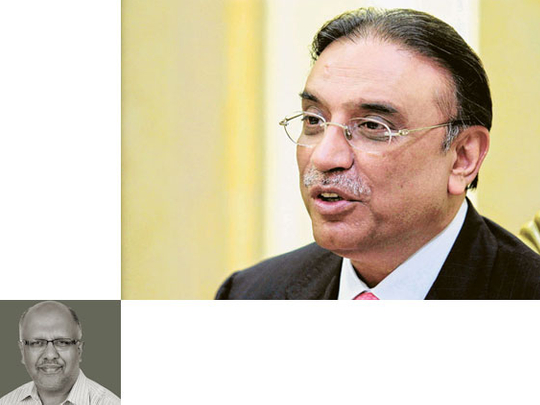
As the countdown continues to tomorrow’s court appearance by Pakistan’s Prime Minister Raja Pervez Ashraf, embroiled in a continuing battle with the Supreme Court, the ruling establishment is eager not to miss an opportunity to deeply politicise the matter.
It was probably in this spirit that Irfan Qadir, Pakistan’s ttorney-general, on Friday chose to defy the apex court when he proclaimed publicly that the prime minister in status remains a step above the court, implying that the head of government is within his rights to defy the court in some matters.
Qadir’s comments should be hardly surprising given that he represents one of the most controversial set of rulers in Pakistan’s history. The case at hand relates to the matter of the government’s refusal to formally request the authorities in Switzerland to reopen a corruption-related investigation against President Asif Ali Zardari, inspite of an order by the court.
At a time when Pakistan suffers from some of the most critical issues imaginable, ranging from economic decay to deepening political disorder, the single-minded obsession by ruling politicians remains to protect Zardari. The matter has already seen Yousuf Raza Gilani, former prime minister, dismissed under a Supreme Court order. Gilani’s downfall came earlier this summer after he repeatedly refused to comply with the court’s order on the matter.
Tomorrow, Ashraf will have the choice of either defying the court or accepting the writ of the highest judicial forum in the land. If he chooses to defy the court as widely predicted, Pakistan’s crisis-ridden conditions will likely aggravate. Essentially, if Ashraf refuses to abide by the country’s laws, the rest of the population cannot be expected to remain law-abiding.
At a time when multiple crises are threatening Pakistan’s future in more ways than one, Ashraf’s defiance will only become a fresh recipe for chaos. For the court too, this could be a deeply defining moment in terms of its own centrality to Pakistan’s present and future. Having already dismissed Gilani for his failure to comply with the court’s order, it will be nothing short of a complete u-turn if it chooses to ignore Ashraf on the same matter. If such shenanigans surround Islamabad, Pakistan is set to suffer in more ways than one.
Indeed, adding the proverbial fuel to the fire has been the experience of the past four years since Zardari and the ruling Pakistan Peoples Party (PPP) came to power. During this time, Pakistan’s key parameters have only gone south and ordinary Pakistanis are increasingly distressed.
During this time, the ruling authorities only paid lip service to the most vital issues. Consequently, it should be no surprise that Pakistanis have found themselves increasingly pushed to protest this year thanks to the worst electricity shortages ever seen in the country’s history. The shortages have relatively eased in the past month or so, but that is due to factors well outside the government’s control.
On the one hand, the monsoon, though delayed, finally arrived and began filling water reservoirs, improving Pakistan’s hydel power generation capacity, which provides cheaper electricity to the national power grid than oil-produced alternatives. On the other hand, a new financial year means that the government is still not under mounting pressure to rein in its out of control expenditure through desperate measures like cutting subsidies for the electricity sector.
In spite of being tainted, Pakistan’s top leaders assume that their positions are well protected. This sense of complacency may indeed only grow if Ashraf survives for the moment. Yet, tragically, he and other leaders may continue to fail in their appreciation of a fundamental reality — the country is continuing to slip under their watch.
Farhan Bokhari is a Pakistan-based commentator who writes on political and economic matters.









